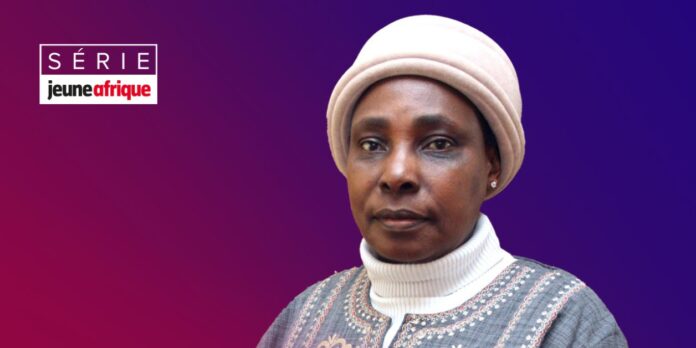in this file

See the entire summary
April 6, 1994 attack: return to investigation into discord between France and Rwanda
- Agathe Habyarimana, the “black widow” of Rwanda
- France-Rwanda: return to a manipulated investigation
[Series] Women in the shadows… and in power (3/5) – Wednesday, April 6, 1994, around 8:30 p.m. In the gardens of the presidential residence in Kigali, Rwanda's history has just changed. Shot down by two surface-to-air missiles, the Falcon 50 carrying the Rwandan president, Juvénal Habyarimana, his Burundian counterpart, Cyprien Ntaryamira, seven members of their respective delegations and the jet's crew, made up of three Frenchmen, from Dar es Salaam was shot down by two surface-to-air missiles fired consecutively as the aircraft begins its approach to the capital's airport.
On the morning of April 7, Jeanne Uwanyiligira, 24, and her sister Marie-Claire Uwimbabazi, 22, headed as quickly as they could to the presidential residence after being overwhelmed by the death in this attack, of their father, Dr. of President Habyarimana.
That day, in the presidential residence and on the terrace, a few dozen meters from the scene of the accident where the twelve passengers slept, the remains of the victims were inscribed. Rwandan soldiers from the presidential guard and French military personnel are also present at the site. In Kigali, since dawn, the massacres against the Tutsis had already ended.
It must be time for meditation. But, according to the two young women, the reaction of the head of state's widow is elderly. “While I was praying, Mrs. Habyarimana was praying out loud asking to help the interahamwe [les miliciens extrémistes Hutu] to get rid of the enemy and for the Rwandan soldiers to have weapons. »
According to other witnesses who entered the presidential residence in the hours following the attack, who will later recount it, namely before the International Criminal Tribunal for Rwanda (ICTR), Agathe Habyarimana said her instructions over the phone, listing the names of the opponents as she eliminated them. Among them, Prime Minister Agathe Uwilingiyimana, a Hutu belonging to an opposition party. She will be killed in cold blood by presidential guards in the early hours of April 7th.
We heard Sister Godelieve say that all Tutsis should be killed
Two sisters of the Head of State – nuns – are also present at the presidential residence, as well as the Archbishop of Rwanda, who happens to be his cousin. there first lady. But it is not to mourn the victims who perished in this attack, nor to pray that Rwanda does not descend into violence. “We heard Sister Godelieve [Habyarimana] say, in the kitchen, that all Tutsis had to be killed”, testify as Dr. Akingeneye's daughters in their set of testimonies.
enemy within
Within the presidential family, according to this report registered on June 22, 1994 by the Belgian military prosecutor – the equivalent of investigating magistrates in military matters – the climate is one of paranoia. “We heard Jeanne Habyarimana [l'une des filles du président défunt]her mother and also Séraphin Rwabukumba [l'un des cousins d'Agathe Habyarimana, qui appartient au premier cercle des extrémistes Hutu] explain on the phone that they were the Belgians [appartenant au contingent of casques bleus dépêchés au Rwanda par l'ONU depuis quelques mois] who shot down the plane and who were fighting alongside the RPF. »
For the extremists around Agathe Habyarimana, the Rwandan Patriotic Front, this rebellion was made up mostly of Tutsis then in the process of being integrated into the army and government under the Arusha peace accords, signed in August 1993, representing the enemy within. And all Tutsis in the country are suspected of forming the fifth column.
“Sometimes, Madam Habyarimana would ask us to go out for certain phone calls,” add the Dr.’s two daughters [par le FPR]. »
Evacuation
On April 9, Agathe Habyarimana was evacuated by the French army who came to organize an expatriate transfer as part of Operation Amaryllis. With her, on the plane, were many important executives of the regime that had just committed the genocide. “She left with the French without asking us to go with her,” said Jeanne Uwanyiligira and Marie-Claire Uwimbabazi. [Rwandai] soldiers took us home on Sunday, April 10, 1994.”
Agathe Habyarimana joined Bangui for the first time with eleven members of her family: sons, daughters, granddaughters, brother, sister, nieces, nephews. Four days later, his fate was sealed at the Élysée during a restricted Council bringing together, around President François Mitterrand and his Prime Minister, Édouard Balladur, the Ministers of Defense (François Léotard), Foreign Affairs (Alain Juppé) and Cooperation. (Michel Roussin), as well as several officials from the Presidency of the Republic, the Prime Minister's Office, the General Secretariat of National Defense (SGDN), the Ministries of Foreign Affairs and Defense and the General Secretariat of the Government. On April 17, the widow of President Juvénal Habyarimana is received in Paris.
This exfiltration is accompanied by two gifts: a bouquet of flowers but above all a check for 200,000 francs at the time (30,487 euros). Officially, this envelope is allocated within the scope of an “Agreement for the contribution of exceptional budgetary assistance to the Republic of Rwanda”, co-signed by the French Ministry of Cooperation, through its chief of staff, Antoine Pouillieute, and the Rwandan Minister of Foreign Affairs Foreign Affairs and Cooperation, Jean-Marie Vianney Ndagijimana.
According to a document made public since then, “the Ministry of Cooperation of the French Republic grants the Rwandan Republic, which requests it, exceptional budgetary assistance” of this amount that “will finance urgent actions in favor of Rwandan refugees”. However, as the daily newspaper revealed liberal, to the Ministry of French Cooperation “everyone knows the beneficiaries”: “The amount is actually paid to the family of the late president, Juvénal Habyarimana. »
She has the devil in her body! She is very difficult to control
A few weeks later, when the genocide perpetrated against the Tutsis had already caused several hundred thousand victims due to the general indifference of the international community, a victim from the NGO Doctors Without Borders had an audience with François Mitterrand at the Elysium. Asked about the exfiltration to France of Agathe Habyarimana, the Head of State utters these few words without concession: “She has the devil in her body! If he could, he would continue to issue calls for massacres from French radio stations. She is very difficult to control. »
An appreciation that contrasts with the clemency that the Head of State had declared a few weeks earlier in relation to the “black widow” of Rwanda.
Northern Clan
Four years before the genocide, Colonel René Galinié, defense attaché at the French embassy in Kigali, had already raised the alarm, but without being taken seriously. In January 1990, in her annual report to the Chief of the Defense Staff, he had in fact indicated that “the president is increasingly accommodating of submitting to the control of his wife's clan, the same clan that will be, in April 1994, the nucleus of the more radical”, recalled, in 2021, in their voluminous report, the historians and jurists of the Research Commission on French archives relating to Rwanda and the Tutsi genocide, chaired by Vincent Duclert.
“This same northern clan, from which the majority of Rwandan Armed Forces (FAR) officers and political executives are recruited, has controlled both the state and the country's economy since they took power in 1973,” he recalled in his report , Colonel Galinié.
Very pious, even frankly fanatical, Agathe Habyarimana even installed a private chapel inside the presidential residence. However, long before the genocide, many testimonies already converged to attribute to him a role that was both discreet and influential at the time when the plan to exterminate the Tutsis was being drawn up. She would have been a pillar of the Akazu (“the little house”, in Kinyarwanda), that informal group of extremists placed at the heart of the state, the army and the business world of which several influential members were related.
asylum
This did not stop Agathe Habyarimana from finding asylum in France in the following years. After a first stay of a few months in France, at the time of the genocide, he will return to Africa for some time, where he will stay in Gabon, the former Zaire and Kenya, before returning to the Paris region at the end of 1998, with a Gabonese passport and fake ID. In the mid-2000s, six of her seven children lived in France, some of them enjoying refugee status, others having even obtained French nationality.
However, Agathe Habyarimana's status will never be formalized. In April 2004, the former first lady therefore seized the mayor of a preliminary request for admission to remain under asylum and, on July 8, 2004, authorized herself to the French Office for the Protection of Refugees and Stateless Persons (Ofpra ). On December 12, 2005, Ofpra having failed to react – which is equivalent to an implicit decision of rejection – this time brought the Refugee Appeals Commission forward.
central role
The soap opera will continue before the Council of State, the highest French administrative court. On 16 October 2009, he fired Agathe Habyarimana once again, reminding her why she could not claim refugee status.
“The Refugee Appeals Commission set out in detail and at length the reasons why it was considered that the genocide committed in Rwanda had been prepared and planned by those in power before 6 April 1994 and that Ms. Habyarimana played a central role of preparation as well as the events that occurred in the first days of the genocide, between April 6 and 9, 1994, and which subsequently maintained contact with the interim government and then with the Rwandan government in exile; that she thus, both in the degree of advance planning for the genocide and in the role of Mrs. Habyarimana, sufficiently justified her decision and placed the judge of cassation in a position to exercise her control. »
In turn, the prefecture of Essonne, the department of Ile-de-France where she lives, will refuse, in 2011, to grant her a residence permit. A decision that will first be rejected by the Administrative Court of Versailles before being confirmed, ultimatelyby the State Council.
Neither a political refugee nor subject to extradition to Rwanda (French jurisprudence systematically rejects this option), Agathe Habyarimana was never tried for her role in the preparation and organization of the genocide perpetrated against the Tutsis in 1994. In February 2022, the investigation The judge Stéphanie Tacheau, responsible for the investigation into “complicity in genocide and crimes against humanity” that persecuted her, opened since 2008 on the initiative of the CPCR, put an end to the considerations of this dossier, a prelude to archiving it – no charges were pronounced against it. Agathe Habyarimana was certainly placed under assisted witness status, but the hypothesis of a referral to a court of law today seems dependent.
Now 80 years old, the former first lady of the “country of a thousand hills”, a French resident without title, will have thus managed to escape trial for a long time, keeping her secrets and benefiting from controversial impunity.

